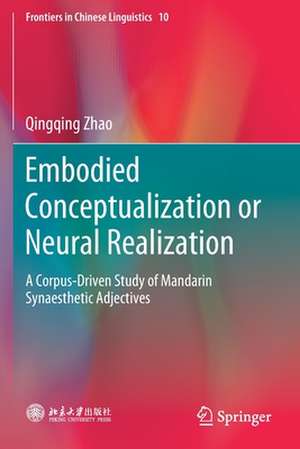Embodied Conceptualization or Neural Realization: A Corpus-Driven Study of Mandarin Synaesthetic Adjectives: Frontiers in Chinese Linguistics, cartea 10
Autor Qingqing Zhaoen Limba Engleză Paperback – 11 sep 2020
This book focuses on linguistic synaesthesia in a hitherto less-studied language – Mandarin Chinese – and adopts a corpus-driven approach to support the analysis and argumentation. The study identifies directional tendencies and underlying mechanisms for Mandarin synaesthetic adjectives. By doing so, it not only provides an added layer of understanding for theories of linguistic synaesthesia, but also offers evidence to help refine previous theories, such as Embodiment Theory and Conceptual Metaphor Theory.
In brief, the book makes a significant contribution to the development of Cognitive Linguistics. The intended readership includes, but is not limited to, graduate students in linguistics and researchers interested in Chinese linguistics in particular, and in lexical semantics and cognitive linguistics in general.
| Toate formatele și edițiile | Preț | Express |
|---|---|---|
| Paperback (1) | 633.68 lei 43-57 zile | |
| Springer Nature Singapore – 11 sep 2020 | 633.68 lei 43-57 zile | |
| Hardback (1) | 639.90 lei 43-57 zile | |
| Springer Nature Singapore – 11 sep 2019 | 639.90 lei 43-57 zile |
Preț: 633.68 lei
Preț vechi: 745.50 lei
-15% Nou
Puncte Express: 951
Preț estimativ în valută:
121.26€ • 126.92$ • 100.92£
121.26€ • 126.92$ • 100.92£
Carte tipărită la comandă
Livrare economică 31 martie-14 aprilie
Preluare comenzi: 021 569.72.76
Specificații
ISBN-13: 9789813293175
ISBN-10: 9813293179
Pagini: 145
Ilustrații: XIII, 145 p. 86 illus.
Dimensiuni: 155 x 235 x 9 mm
Greutate: 0.23 kg
Ediția:1st ed. 2020
Editura: Springer Nature Singapore
Colecția Springer
Seria Frontiers in Chinese Linguistics
Locul publicării:Singapore, Singapore
ISBN-10: 9813293179
Pagini: 145
Ilustrații: XIII, 145 p. 86 illus.
Dimensiuni: 155 x 235 x 9 mm
Greutate: 0.23 kg
Ediția:1st ed. 2020
Editura: Springer Nature Singapore
Colecția Springer
Seria Frontiers in Chinese Linguistics
Locul publicării:Singapore, Singapore
Cuprins
Chapter 1.- Introduction to synaesthesia.- Chapter 2 Methodology: A corpus-driven approach.- Chapter 3 Mandarin tactile adjectives.- Chapter 4 Mandarin gustatory adjectives.- Chapter 5 Mandarin visual, auditory, and olfactory adjectives.- Chapter 6 Mandarin compound adjectives combining different modalities.- Chapter 7 From linguistic synaesthesia to Conceptual Metaphor Theory and embodiment.- Chapter 8 Conclusion.
Notă biografică
Dr Qingqing Zhao received her PhD from the Department of Chinese and Bilingual Studies at The Hong Kong Polytechnic University, and is currently an Assistant Professor at the Institute of Linguistics, Chinese Academy of Social Sciences. Her main research interests are lexical semantics and cognitive linguistics, topics on which she has published more than ten papers in high-impact SCI/SSCI journals and prestigious CSSCI journals, including Linguistics, PLoS ONE, Zhongguoyuwen, and so on.
Textul de pe ultima copertă
This book focuses on linguistic synaesthesia in a hitherto less-studied language – Mandarin Chinese – and adopts a corpus-driven approach to support the analysis and argumentation. The study identifies directional tendencies and underlying mechanisms for Mandarin synaesthetic adjectives. By doing so, it not only provides an added layer of understanding for theories of linguistic synaesthesia, but also offers evidence to help refine previous theories, such as Embodiment Theory and Conceptual Metaphor Theory.
In brief, the book makes a significant contribution to the development of Cognitive Linguistics. The intended readership includes, but is not limited to, graduate students in linguistics and researchers interested in Chinese linguistics in particular, and in lexical semantics and cognitive linguistics in general.
Caracteristici
Focuses on linguistic synaesthesia in a hitherto less-studied language Discusses a wealth of interdisciplinary theories Challenges previous assumptions regarding linguistic synaesthesia Holds significant implications for linguistics, cognitive science, and neuroscience










